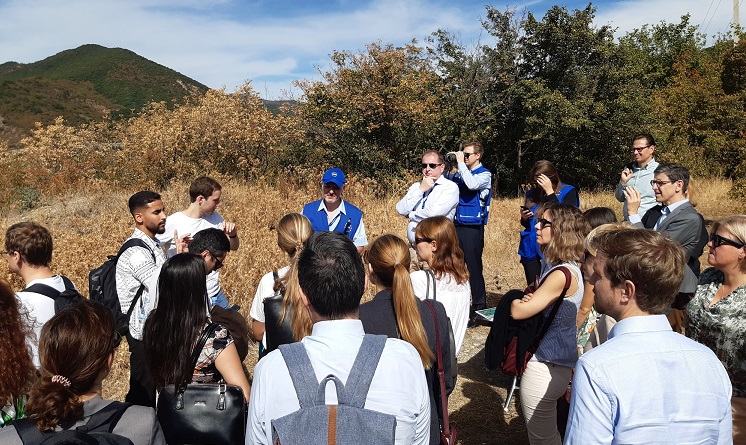EUMM mission head to Georgia briefs EU Council delegates on Russian occupation activities

Marek Szczygieł, the head of the European Union monitoring mission to Georgia, on Wednesday hosted a delegation of the Council of Europe Union Working Party on Eastern Europe and Central Asia. Photo: EUMM Georgia press office
Marek Szczygieł, the head of the European Union monitoring mission in Georgia, on Wednesday hosted a delegation of the Council of European Union Working Party on Eastern Europe and Central Asia in the central Georgian village of Odzisi, adjacent to the country’s Russian-occupied Tskhinvali (South Ossetia) region, to brief them about consequences of the occupation.
EUMM to Georgia said the discussion had included the most recent security developments along the administrative boundary line separating the occupied region from the rest of Georgia, and their impact on the daily life and human rights of conflict-affected communities.
Stressing the importance of the temporary openings of crossing points along the Tskhinvali ABL in late August and September, as well as the recent announcement by the de facto authorities over planned temporary openings of the crossing points at the end of each month until December, Szczygieł reiterated his mission and the Organisation for Security and Co-operation in Europe continued to call for a “full resumption” of freedom of movement across the ABL for the benefit of local communities.
Today, @EUMMGeorgia_HoM hosted a delegation of @EUCouncil Working Party on Eastern Europe & Central Asia to the ABL in the Odzisi area. He explained how ‘borderisation’ activities have a negative effect on freedom of movement and welcomed temporary openings of crossing points. pic.twitter.com/I0qlRNgyPd
— EU Monitoring Mission in Georgia (@EUMMGeorgia) September 28, 2022
The ambassador Szczygieł further stressed the negative impact of the ongoing ‘borderisation’ activities on local population’s freedom of movement, in particular their access to medical care, education, and social services'”, EUMM Georgia said.
The EUMM is the only foreign mission observing activities adjacent to the Russian-occupied regions of Abkhazia and Tskhinvali over the last 14 years since the Russia-Georgia 2008 war.
- EUMM Georgia marks 14th anniversary in country as only foreign mission monitoring Russian occupation
The mission was deployed in September 2008, following an EU-mediated ceasefire which ended the war, to contribute to “stabilisation, normalisation and confidence-building between the conflict parties”.
- See Agenda.ge multimedia: EU’s eyes and ears on Russia’s creeping occupation of Georgia
Headquartered in Tbilisi, the mission has field offices in the central Georgian city of Gori - near occupied Tskhinvali - as well as the central-eastern city of Mtskheta and Zugdidi in the west of the country, near occupied Abkhazia.
 Tweet
Tweet  Share
Share